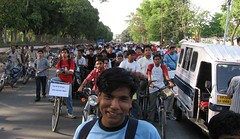Unlike what some people would have you believe, everything is not black and white. There are a lot of grey areas. In fact, grey areas form the majority. The whiteness or blackness of the grey areas could be a subject of debate. There would be some grey areas which people wont dispute about it being more white than black and vice versa. Of course, there are always some radicals who question that. And there would be some grey areas about which there will always be a dispute regarding its dominant colour (white or black). Considering that there were no objective means to solve this dispute, it really becomes hard to come to a conclusion regarding those grey grey areas. Unless, one group is able to convince all the others, there would be no consensus regarding this issue.
There are many kinds of people in this world.
There are people who refuse to see the grey areas in the world and their dichotomy of the world into black and white is dictated by dogma, religious or others. They are what we would call the fundamentalists, who are so incredibly stubborn that it is quite a stupid thing to even try to explain that it is not that simple. I won't even consider having a conversation with them because it is quite impossible not to feel frustrated while talking to them.
There are those who do believe in the grey areas. They see it and decide how white or black it is. And they form strong opinions about that. So, again the dichotomy appears with such kinds of people. They see the grey but form two opposing camps with exactly opposite opinion about what is the dominant colour in that particular grey. They confront eachother with their opinions and are quite intransigent about them. For both of them, it is obvious which is the dominant colour and they are unable to understand why the people in the other camp are blind to that fact! Both cannot objectively quantize why they feel so about that particular grey area. Their inability to put their perception into words created more frustration. When they do put those perceptions into words, they know that it is imperfect representation and they get attacked for it. Neither camp gets anywhere in trying to convince the other because for both of them there could be no other view regarding which view is the right one.
Intolerance breeds not only in fundamentalists but also in people who refuse to see that human perception is not perfect and what is obvious to one need not be obvious to the other.
In a recent discussion with Falstaff, he mentioned that the dichomtomy of right and wrong works at a very micro level, ie, you can divide any issue into atomic subissues (my grey dots) about which you form an opinion about whether it is right or wrong. And depending on what you think about each sub-issue and how much weightage you give to each of them, you form a opinion about the issue in question.
So, there can be very complex and varied views about the same issue. There would be a mulitplicity of views on any issue and it would be wrong to simplify this complexity into just two opposing camps. But, in general, that is what usually happens. Most of the time, we do not do a self-analysis about what goes into out thought process in coming to a particular conclusion. Most of the times, it is 'obvious that we are right'. The question of why is never answered, because obvious things do not need any explanation. This refusal/inability to analyse their own views and that of others leads to misunderstanding and confrontations that lead nowhere. People who do put forth some logical views and base them on facts are dismissed by the other side using one of several mind-block techniques. One of the most common amongst people is dismissing someone's opinion as being marxist, which basically stems from a misunderstanding of marxism (someday I will write a short introduction about marxist schools of thoughts).
How are such issues resolved? I do not think there is any other way to resolve it than to submit the case/disagreement before an accepted authority like the Supreme Court and accept whatever decision that that authority gives out. Sadly, you cannot question the decision of the court in India because that is punishable as 'contempt of court'. But that is a different issue.
This kind of dependence on one authority to resolve conflicts is not healthy because after all the judges are human. What it leads is to a sense of victory/defeat in the two parties and no real understanding of the other point of view. The best way to resolve this conflict is through dialogue, debate and compromises. What I am suggesting is a form of a participatory democracy where people decide for themselves on issues that concern them. We do not have such a tradition in India and that I think is the bane of Indian democracy.
Blogs have been pretty important in this process of debate because of their numerous advantages. Physical proximity is not an issue. Temporal proximity is also not an issue. So, on blogs and discussion boards, we could very well have a debate that spreads over days and involves people from all over the world. Of course, the disadvantage would be that the online world is elitist and involves people who have access and knowledge. So, it involves a small subset of people and does not have the diversity that is desired.
What have I professed? That we should debate, respect each other views and be more open to opposing views. Of course, there are some who are just plain wrong. For example, read the comments of Falstaff's post. There is a person who goes my the name of MockTurtle who posits the view that rape stems from a 'natural male urge' and he gives the examples of the predominance of rape in the animal world. What I find amusing is that he seems to say that sexual urges cannot be controlled sometimes and that they can be quite overwhelming. I wonder whether he poops and pisses in his pants because isn't that what animals do. They poop wherever they want, whenever they want. His argument is just plain wrong. I could never respect his views nor come to a compromise with this person. And if some judge ruled in his favour, I would probably be jailed for contempt of court.
It is not just in views that people differ. They may agree that there is a problem but may disagree with the methodologies adopted for rectifying this problem. They would have different but strong opinions about what may or may not be the 'right' way to go about changing the situation. The problem is that they have only an idea of how their solution would shape up and they have no way of knowing whether it is indeed the 'right' way of going about it. That is where the importance of dialogue and compromises come in.
India has a lot of problems but we cannot solve it without active involvement. The caste system is a social evil that needs to be eliminated. If people do not take positive steps towards it, the government does not any choice but to enforce a top-down approach to bring justice to the downtrodden. I would always resent the fact that the government comes up with strong measures that border on dictatorial but quite frankly, when the problem is people themselves, there is no other alternative. Grassroot movements are usually local and take too much time. But admittedly, they are the best approach. We do need a grassroot movement that addresses the issues that concern our people.
, , , ,



